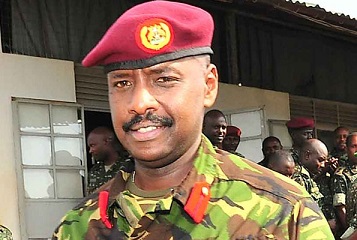By AGGREY BULUBA
In Uganda, where political legacies are often carefully nurtured, Gen. Muhoozi Kainerugaba, the Chief of Defence Forces (CDF) and son of President Yoweri Museveni, has long been at the center of discussions regarding succession. While many once viewed him as a likely successor to his father, his recent public declaration not to run for the presidency in the 2026 general election surprised many. Instead, he endorsed his father’s continued leadership, leaving questions about his political ambitions unanswered. Despite his powerful military position, many Ugandans do not perceive him as a natural leader. As the saying goes, “The fool speaks with his mouth but thinks with his heart,” and Muhoozi’s controversial social media presence underscores a leader still grappling with his public persona.
Social Media as a Double-Edged Sword
Muhoozi’s online presence has become a defining feature of his public image—unpredictable, bold, and frequently contentious. His posts range from comments on military matters and politics to foreign policy. However, his tweets often spark more controversy than clarity, leaving many wondering whether his statements reflect genuine strategic insight or impulsive bravado. “The mouth of a man is his destiny,” and Muhoozi’s words shape not only his own image but also that of the government he represents.
Although some posts aim to project strength and leadership, they often lack the nuance and foresight expected of a high-ranking officer. “A wise man’s heart guides his mouth,” yet Muhoozi’s social media often appears impulsive, leading to questions about his preparedness for greater responsibilities.
Public Perception and Political Rhetoric
A significant portion of Muhoozi’s social media activity involves attacks on opposition leader Robert Kyagulanyi, popularly known as Bobi Wine. Referring to him as “Kabobi,” Muhoozi’s provocative statements aim to discredit Bobi Wine’s political career. While some supporters view this as a sign of political rivalry, many Ugandans see it as unnecessary and divisive. “What the fool does in the morning, the wise man will do in the evening,” aptly describes how these attacks undermine his credibility. Rather than fostering unity, his rhetoric deepens Uganda’s political polarization.
Muhoozi’s remarks on women and his self-aggrandizing comments, such as suggesting he host a TV show to showcase “what a handsome man looks like,” have drawn widespread public criticism. These statements, often perceived as immature, detract from his image as a serious leader and raise doubts about his political maturity.
Diplomatic Fallout
Muhoozi’s unfiltered tweets have not only stirred domestic controversy but also strained Uganda’s international relations. In 2022, a tweet about capturing Nairobi within two weeks sent shockwaves across East Africa, leading to diplomatic tensions with Kenya. President Museveni was forced to issue an official apology to mitigate the fallout. Similarly, Muhoozi’s comments about military action in Sudan and threats against foreign nationals working in Eastern DR Congo have drawn sharp criticism. “A single spark can set a forest on fire,” and his words have often ignited diplomatic crises that tarnish Uganda’s reputation.
Balancing Criticism and Opportunity
Despite his critics, some Ugandans believe Muhoozi’s social media activity offers a form of transparency in a political system often viewed as opaque. His open, unfiltered thoughts provide insights into his views on national and international issues. However, “The fool’s tongue is long enough to cut his own throat,” and his impulsive statements frequently overshadow any positive contributions.
One notable exception was his call for improved Uganda-Rwanda relations, which many saw as a step toward resolving regional tensions. “A well-watered tree bears fruit,” and this instance highlights the potential for Muhoozi to use his platform constructively. Still, such moments are rare and often overshadowed by his more controversial remarks.
Leadership Potential and Lessons Ahead
Muhoozi’s decision not to run for president in 2026 has momentarily quelled speculation about his political ambitions. However, his social media behavior continues to raise questions about his readiness for leadership. “Words are like arrows; once they leave the bow, they can’t be retrieved,” and his past statements have left lasting impressions that are difficult to erase.
If Muhoozi seeks to build a credible political future, he must adopt a more disciplined approach to communication. Social media, as a tool of leadership, demands responsibility. “Even the best warrior needs a strategist,” and consulting communication experts could help refine his messaging and ensure his statements are more measured and constructive.
Rather than engaging in personal attacks or divisive rhetoric, Muhoozi could use his platform to foster unity and address substantial political issues. “The tongue can conceal the truth, but the eyes never,” and by engaging with the public in a mature manner, he could shift the narrative away from controversy toward constructive dialogue.
A Path Forward
Muhoozi has the opportunity to evolve into a respected figure if he embraces a more thoughtful and strategic approach. “The best time to plant a tree was 20 years ago, but the second best time is now.” It is not too late for him to adjust his course and become a leader who inspires rather than divides.
To achieve this, Muhoozi must focus on fostering dialogue, listening to diverse perspectives, and prioritizing unity over conflict. By doing so, he can demonstrate the maturity and vision required to navigate Uganda’s complex political landscape and position himself as a leader worthy of national and international respect.
The writer is a seasoned journalist and non-partisan social-political commentator.







Discussion about this post